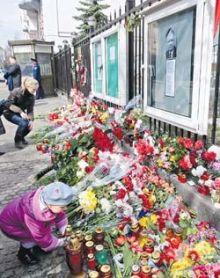“Bo e, co to znaczy?”
It would be worthwhile for us, Ukrainians, to repeat as a refrain this desperate cry of the Polish political writer Jan Turnau, which appeared on Gazeta Wyborcza’s website on The Day of the Polish Tragedy, in reply to the conspicuous silence that the Ukrainian television maintained about the Saturday event in Russia.
“My God, what does this mean?”
Why is the state television – the 1st National Channel which all of us keep afloat by loosening our purse-strings – making ungrateful louts out of Ukrainians and broadcasting a second-rate Eurovision show, while the bottom of the footage reminds us that Victory Day is 29 days away? It is a reaction worthy of the most cynical commercial broadcaster. The 1st Channel’s drift towards the commercial shores is all too apparent.
And look at the opposite riverbank: cynicism is running riot. While the Poles, our neighbors and brothers (much more brothers than our northern neighbors), are mourning the “beheading” of their country, Inter, ICTV, and New Channel are showing pop singer Alla Pugachova and poet Ilya Reznik, entertainment programs Great Difference and Star Factory, respectively.
Are there any HUMANS left among the Ukrainian television management?
The Ukrainians who usually do not or cannot watch the 5th Channel (last Saturday it worked in the marathon format) or surf through news websites, might well have remained unaware of the Polish tragedy. Ukrainian television tends to avoid things like that. And even if it does not, they do it at the level of a succinct report in a news bulletin.
This is quite an expected reaction to such an event in a neighboring friendly country (it took a long and difficult path of atonement and forgiveness to strike up a friendship) on the part of the TV channels of a country which has failed to build any system of coordinates or values and where society has lost the very idea of humanness and human adequacy.
Is it worthwhile to seek any similarities between this shameful media response and the equally shameful reaction of this country’s leaders? It certainly is. On April 10 the main piece of news on the President of Ukraine’s website was a meeting with Russia’s Foreign Minister Sergei Lavrov, while rather a cold expression of condolences to the Polish people was placed among the news of secondary importance. Meanwhile, Georgia, a country that is not so close to Poland as Ukraine, declared mourning as soon as on Sunday.
Naturally, it is tempting to put down the barbaric simultaneity of television and the government to some kind of directives from above and censorship. But this simultaneity seems to be of a more fatal nature. It is deep-rooted in the common system of life philosophy, in the loss of humanness. It is just funny to speak about the freedom of speech here, for it is unnecessary for being able to express heartfelt sympathy.
Besides, could anything else be expected from those who react contemptuously and cynically even to our country’s own blood, history, and tragedies? All this is part of the loutish tradition of ingratitude and loss of memory.
What “Katyn-2” needs is not only sympathy but also reconsideration on a level that is higher than “geopolitical consequences for Ukraine” – on the historical or even philosophical level. But there is nobody who could discuss such serious things on Ukrainian television. Many “serious” journalists are saying today they intend to switch to the print media which they think are more fruitful than the “TV Sahara” that kills the thought. It is very probable that we will see paper publications getting the upper hand again against the backdrop of the complete marginalization of television and the so far insufficient access of the public to the Internet.
For many of those who have access to the Net, online communities and social networking sites are now the best source of information, versions, and analysis (far from perfect, though) with respect to “Katyn-2.” And, after all, the Net is the only mass medium that has displayed, at least to some extent, a genuinely human and sympathetic reaction of Ukrainian society to the Polish Tragedy. Unfortunately, television has remained, for rare exceptions, a “mental impotent” as long as the Ukrainians carried candles and flowers to the Polish consulates in Kyiv and Lviv, as long as the lights of our mourning were on in our windows.







